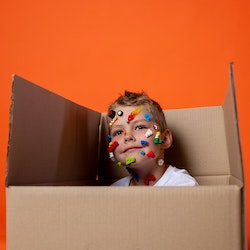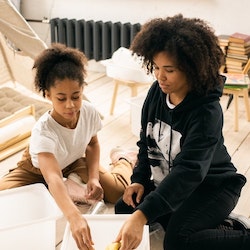The isolation caused by the pandemic has led to more imaginative (and sometimes odd) behaviors. It can be both worrisome and hilarious.
The other night, my 11-year-old announced that he requires walk-in and walk-out music when entering and leaving my room. He dances in to the Perry the Platypus song from Phineas and Ferb (it’s pretty catchy) and he exits to music that “reflects his mood.” I’m so glad I have an Alexa.
Soon my 13-year-old joined in and I found my two relatively “normal” kids acting like lunatics, dancing into and out of my room. I really appreciated it – especially as I was trying to work. At least they didn’t set the house on fire.
But the dancing isn’t the only odd behavior I’ve noticed. And I have a feeling that I am not alone. Is there more to this or do I just have cuckoo kids?
Katie Lear, a child psychotherapist, told me that because the pandemic has meant fewer interactions with peers, she’s observed children “adapting to this change by relying more on their imaginations to entertain and self-soothe.” Lear says that it’s perfectly normal to “see some idiosyncratic, funny imaginative play emerge” as a result. “The pandemic has been so disruptive that it’s no wonder kids are creating narratives for themselves about the new reality they find themselves in.”
That’s good to know. Yet, there’s no way we were meant to live like this – both isolated and forced together at the same time. But I see a silver lining. Maybe kids are acting in weird ways because they just want to be who they are. The absence of peer judgment can be liberating. Part of me is thrilled that my 7th-grade daughter hasn’t had to deal with everything that comes with being a 7th grader. She hasn’t had to worry about what she’s wearing or where to sit at lunch. The occasional pimple isn’t a crisis, and she hasn’t had to deal with the dreadful embarrassment caused by her parents (her words).
But still, it can be unsettling to walk into your child’s room and see her rolling around on the floor trying to twist herself into a pretzel (my neighbor’s kid), find out he slept through his morning classes (also my neighbor’s kid!), insist on wearing one tall sock (a friend’s kid), or see them wearing their underwear on their head (my kid). I’d like to think they are just being themselves, letting off steam without people around who will make them feel bad for it.
Dr. Jessica Myszak, a child psychologist and the director of The Help and Healing Center, believes there are two reasons we may be seeing weird behavior from our kids. The first has to do with the fact that kids aren’t used to having so much free time without activities. “Being bored, they are finding creative ways to entertain themselves and meet their sensory, physical, and cognitive needs. Boredom breeds creativity, and sometimes that creativity can be pretty darn weird,” she says.
The second reason is that parents are more likely to be home noticing their children’s behavior. “Things that might be occurring at school, at daycare, or on the playground are now occurring at home, so parents are more aware of these behaviors.”
Weird behaviors aren’t the province of younger kids alone. Teens are running their lives from their beds, surrounded by piles of dishes. They’re napping between classes and doing who knows what else. I feel for them in particular because adolescence is all about individuation and identity formation. Even when they do get to be with peers again, I wonder what impact masks will have on their social-emotional development. It’s not easy reading social cues when everyone’s face is covered.
Fortunately, according to Myszak, most weird behavior in children passes. “Kids do weird stuff,” she said. “It is typically short-lived and nothing to worry about. In fact, many of these will be things you can look back and laugh about later.”
Sounds great, if I don’t lose my mind first.


